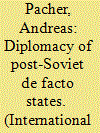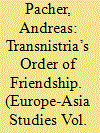| Srl | Item |
| 1 |
ID:
169781


|
|
|
|
|
| Summary/Abstract |
Why do post-Soviet de facto states (such as Abkhazia and South Ossetia) regularly interact with remote Pacific islands or Latin American countries, even though they are not bound by any meaningful political, economic or military ties? This article argues that the diplomatic relationship management amounts to a strategy of external legitimacy-building through stigma rejection and ontological security-attainment. This diplomatic practice creates positively tinged social affiliations, whereby the unrecognized entities aim to have their identity as ‘normal’ states affirmed. It renders the international society’s stigma ineffective, thus facilitating a potential exit from the stigma. By illuminating the performative aspects behind the de facto states’ quest for recognition, this article uncovers the de facto states’ agency and analytically emancipates them from the structural factor of ‘Russia-as-a-great-power’. It also contributes to the literature of ontological security by highlighting how positive (rather than conflictual) relationships, and how transformed (rather than stable) identities can be conducive to its attainment. This article generally highlights the need to analyse de facto states’ foreign relations more holistically than previously done.
|
|
|
|
|
|
|
|
|
|
|
|
|
|
|
|
| 2 |
ID:
174389


|
|
|
|
|
| Summary/Abstract |
What strategies do de facto states employ in conducting their diplomacy? This article examines Transnistria’s Order of Friendship, a state award that primarily targets foreigners, by analysing the profiles of all known award recipients. The Order is found to be a political tool to enhance Transnistria’s domestic and external legitimacy in the absence of recognised sovereignty. The findings confirm the literature on Transnistria’s ‘bandwagoning’ with Russia, indicate that a patron’s support must be actively sought rather than taken for granted, and—since many awardees are from jurisdictions other than the patron state Russia—point to the need to examine the foreign policy of de facto states more holistically.
|
|
|
|
|
|
|
|
|
|
|
|
|
|
|
|